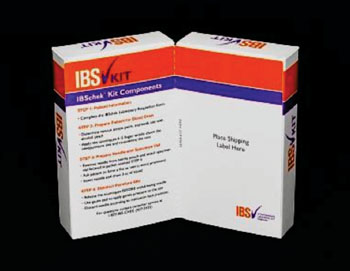Definitive Tests for Irritable Bowel Syndrome Developed
By LabMedica International staff writers
Posted on 25 May 2015
In the clinical evaluation of chronic diarrhea, common differential diagnoses include diarrhea-predominant irritable bowel syndrome (D-IBS), inflammatory bowel disease (IBD) and celiac disease. Posted on 25 May 2015
Although the anti-tissue transglutaminase antibody (anti-tTG) has proven to be an excellent biomarker for identifying celiac disease, D-IBS remains a diagnosis of exclusion since the clinical criteria for IBS, do not exclude IBD.

Image: IBSchek Blood Test kit for irritable bowel syndrome (Photo courtesy of Commonwealth Laboratories Inc.).
Scientists at Cedars-Sinai Medical Center (Los Angeles, CA, USA) and their collaborators recruited a total of 2,681 subjects. This included 2,375 D-IBS subjects, 43 healthy subjects, 121 celiac and 142 IBD subjects which included 73 with Crohn’s and 69 ulcerative colitis patients. IBS subjects were on average 3.9 years older than the non-IBS groups. There were no differences in sex distribution of IBS and non-IBS subjects; however, percentage of females was greater in the healthy controls, IBS and celiac groups as compared with the IBD group.
Plasma was collected from all subjects and tested by enzyme-linked immunosorbent assay for antibodies to cytolethal distending toxin B (CdtB) and vinculin. Tetramethylbenzidine (TMB) substrate solution was used for visualization and immediately read on a BioTek Synergy HT plate reader (Winooski, VT, USA). The optical densities (OD) were read for 90 minutes at 370 nm and used to compare levels of anti-CdtB or anti-vinculin. Raw OD values were used for the data analysis.
Using optical density levels, anti-CdtB antibody levels in D-IBS subjects were 2.53 ± 0.69 which were significantly higher than healthy subjects at 1.81 ± 0.73, Crohn’s disease at 1.72 ± 0.81, ulcerative colitis at 1.54 ±0.68 and celiac disease at 2.23±0.70. There were no differences in anti-CdtB levels between healthy subjects and IBD subjects; however, subjects with celiac disease had higher anti-CdtB levels than all other non-IBS groups. The tests are marketed under the name IBSchek and are produced by Commonwealth Laboratories Inc. (Salem, MA, USA).
Mark Pimentel, MD, who created the tests and is the senior author of the study, said, “Having an early diagnosis means patients can avoid years of invasive tests and visits to specialists that often leave them with more questions than answers. With these new blood tests, many patients will now be able to proceed right to therapy for their condition.” The study was published on May 13, 2015, in the journal Public Library of Science ONE.
Related Links:
Cedars-Sinai Medical Center
BioTek
Commonwealth Laboratories Inc.














